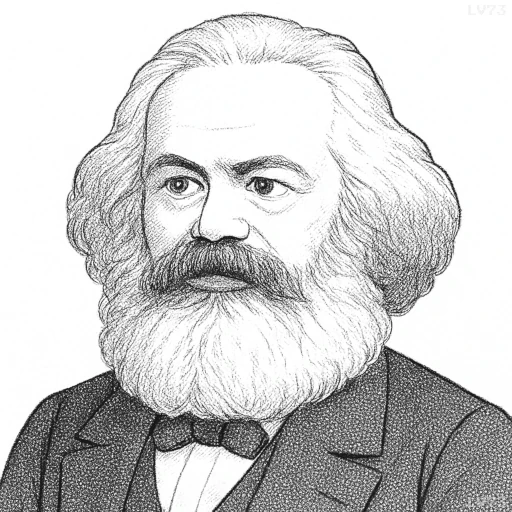“Capital is money, capital is commodities. By virtue of it being value, it has acquired the occult ability to add value to itself. It brings forth living offspring, or, at the least, lays golden eggs.”

- May 5, 1818 – March 14, 1883
- Born in the Kingdom of Prussia (Germany)
- Philosopher, economist, political thinker
table of contents
Quote
“Capital is money, capital is commodities. By virtue of it being value, it has acquired the occult ability to add value to itself. It brings forth living offspring, or, at the least, lays golden eggs.”
Explanation
In this quote, Marx is describing the paradoxical nature of capital in the capitalist system. Capital is both money and commodities, and its core feature is that it adds value to itself. Marx refers to this process as an “occult” or mysterious ability, highlighting how capital seems to grow and multiply through investment and exchange, independent of the labor directly involved. The metaphor of capital “bringing forth living offspring” or “laying golden eggs” illustrates how money or commodities can generate more wealth without any immediate physical labor being involved, akin to a magical or self-sustaining process.
Marx’s critique is centered on how this process obscures the real source of value—human labor. The labor of workers creates value, but in capitalism, the owners of capital (whether in the form of money or commodities) can profit from it without contributing directly to production. This phenomenon of capital seemingly increasing its own value through investment or speculation is one of the key aspects of Marx’s theory of surplus value—the idea that capitalists extract value from workers’ labor, which they do not compensate fully. In this system, workers are exploited, while capital grows through mechanisms that obscure the role of human effort.
This idea remains pertinent in modern economies, especially in financial markets or industries focused on investment and capital growth. For example, in the stock market, investments often increase in value not through tangible production but through speculation and financial maneuvering, which Marx would view as an extension of capital’s ability to “add value to itself.” Similarly, in industries where wealth is generated primarily through capital ownership—such as real estate or technology—owners and investors can see returns that far exceed their original input, reflecting the self-replicating nature of capital Marx described. This concept is central to understanding the dynamics of wealth inequality in modern capitalism, where those with capital can accumulate even more without engaging in traditional labor.
Would you like to share your impressions or related stories about this quote in the comments section?


